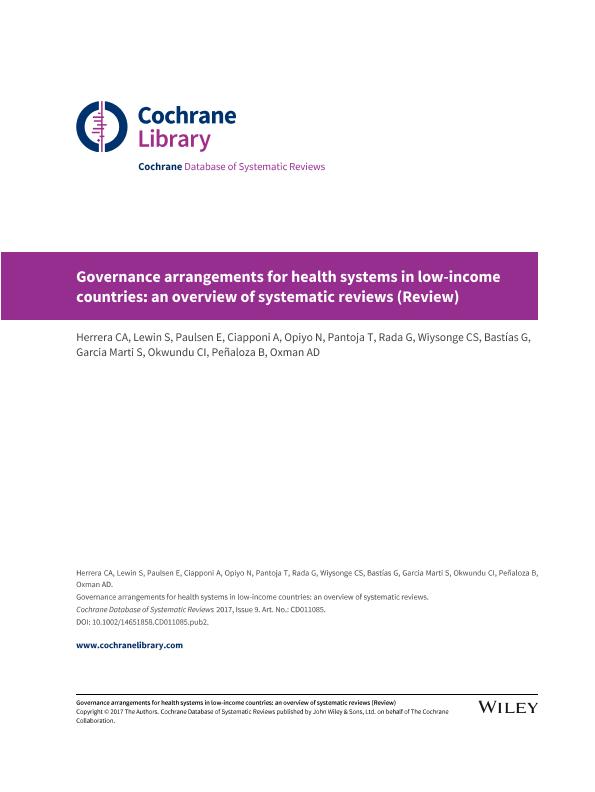Artículo
Governance arrangements for health systems in low-income countries: An overview of systematic reviews
Herrera, Cristian A.; Lewin, Simon; Paulsen, Elizabeth; Ciapponi, Agustín ; Opiyo, Newton; Pantoja, Tomas; Rada, Gabriel; Wiysonge, Charles S.; Bastías, Gabriel; García Martí, Sebastián
; Opiyo, Newton; Pantoja, Tomas; Rada, Gabriel; Wiysonge, Charles S.; Bastías, Gabriel; García Martí, Sebastián ; Okwundu, Charles I.; Peñaloza, Blanca; Oxman, Andrew D.
; Okwundu, Charles I.; Peñaloza, Blanca; Oxman, Andrew D.
 ; Opiyo, Newton; Pantoja, Tomas; Rada, Gabriel; Wiysonge, Charles S.; Bastías, Gabriel; García Martí, Sebastián
; Opiyo, Newton; Pantoja, Tomas; Rada, Gabriel; Wiysonge, Charles S.; Bastías, Gabriel; García Martí, Sebastián ; Okwundu, Charles I.; Peñaloza, Blanca; Oxman, Andrew D.
; Okwundu, Charles I.; Peñaloza, Blanca; Oxman, Andrew D.
Fecha de publicación:
09/2017
Editorial:
John Wiley & Sons Ltd
Revista:
Cochrane Database of Systematic Reviews
ISSN:
1469-493X
e-ISSN:
1465-1858
Idioma:
Inglés
Tipo de recurso:
Artículo publicado
Clasificación temática:
Resumen
Background: Governance arrangements include changes in rules or processes that determine authority and accountability for health policies, organisations, commercial products and health professionals, as well as the involvement of stakeholders in decision-making. Changes in governance arrangements can affect health and related goals in numerous ways, generally through changes in authority, accountability, openness, participation and coherence. A broad overview of the findings of systematic reviews can help policymakers, their technical support staff and other stakeholders to identify strategies for addressing problems and improving the governance of their health systems. Objectives: To provide an overview of the available evidence from up-to-date systematic reviews about the effects of governance arrangements for health systems in low-income countries. Secondary objectives include identifying needs and priorities for future evaluations and systematic reviews on governance arrangements and informing refinements of the framework for governance arrangements outlined in the overview. Methods: We searched Health Systems Evidence in November 2010 and PDQ Evidence up to 17 December 2016 for systematic reviews. We did not apply any date, language or publication status limitations in the searches. We included well-conducted systematic reviews of studies that assessed the effects of governance arrangements on patient outcomes (health and health behaviours), the quality or utilisation of healthcare services, resource use (health expenditures, healthcare provider costs, out-of-pocket payments, cost-effectiveness), healthcare provider outcomes (such as sick leave), or social outcomes (such as poverty, employment) and that were published after April 2005. We excluded reviews with limitations that were important enough to compromise the reliability of the findings of the review. Two overview authors independently screened reviews, extracted data and assessed the certainty of evidence using GRADE. We prepared SUPPORT Summaries for eligible reviews, including key messages, 'Summary of findings' tables (using GRADE to assess the certainty of the evidence) and assessments of the relevance of findings to low-income countries. Main results: We identified 7272 systematic reviews and included 21 of them in this overview (19 primary reviews and 2 supplementary reviews). We focus here on the results of the 19 primary reviews, one of which had important methodological limitations. The other 18 were reliable (with only minor limitations). We grouped the governance arrangements addressed in the reviews into five categories: authority and accountability for health policies (three reviews); authority and accountability for organisations (two reviews); authority and accountability for commercial products (three reviews); authority and accountability for health professionals (seven reviews); and stakeholder involvement (four reviews). Overall, we found desirable effects for the following interventions on at least one outcome, with moderate- or high-certainty evidence and no moderate- or high-certainty evidence of undesirable effects. Decision-making about what is covered by health insurance - Placing restrictions on the medicines reimbursed by health insurance systems probably decreases the use of and spending on these medicines (moderate-certainty evidence). Stakeholder participation in policy and organisational decisions - Participatory learning and action groups for women probably improve newborn survival (moderate-certainty evidence).- Consumer involvement in preparing patient information probably improves the quality of the information and patient knowledge (moderate-certainty evidence). Disclosing performance information to patients and the public - Disclosing performance data on hospital quality to the public probably encourages hospitals to implement quality improvement activities (moderate-certainty evidence).- Disclosing performance data on individual healthcare providers to the public probably leads people to select providers that have better quality ratings (moderate-certainty evidence). Authors' conclusions: Investigators have evaluated a wide range of governance arrangements that are relevant for low-income countries using sound systematic review methods. These strategies have been targeted at different levels in health systems, and studies have assessed a range of outcomes. Moderate-certainty evidence shows desirable effects (with no undesirable effects) for some interventions. However, there are important gaps in the availability of systematic reviews and primary studies for the all of the main categories of governance arrangements.
Palabras clave:
Health systems
,
Systematic reviews
Archivos asociados
Licencia
Identificadores
Colecciones
Articulos(CIESP)
Articulos de CENTRO DE INVESTIGACIONES EN EPIDEMIOLOGIA Y SALUD PUBLICA
Articulos de CENTRO DE INVESTIGACIONES EN EPIDEMIOLOGIA Y SALUD PUBLICA
Citación
Herrera, Cristian A.; Lewin, Simon; Paulsen, Elizabeth; Ciapponi, Agustín; Opiyo, Newton; et al.; Governance arrangements for health systems in low-income countries: An overview of systematic reviews; John Wiley & Sons Ltd; Cochrane Database of Systematic Reviews; 2017; 9; 9-2017; 1-95
Compartir
Altmétricas



